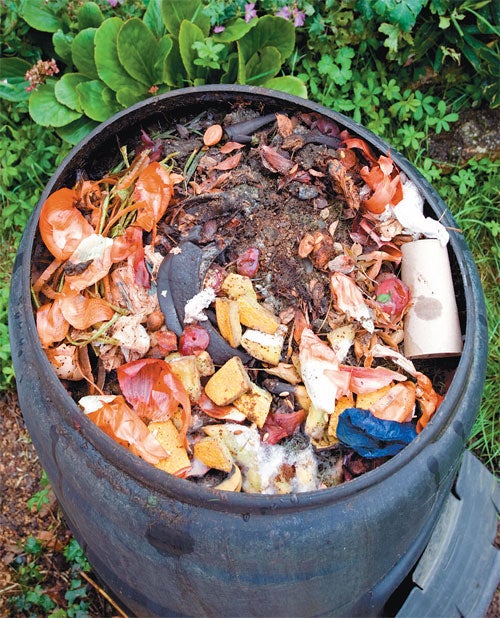Urban gardener: Any old rubbish?

Your support helps us to tell the story
From reproductive rights to climate change to Big Tech, The Independent is on the ground when the story is developing. Whether it's investigating the financials of Elon Musk's pro-Trump PAC or producing our latest documentary, 'The A Word', which shines a light on the American women fighting for reproductive rights, we know how important it is to parse out the facts from the messaging.
At such a critical moment in US history, we need reporters on the ground. Your donation allows us to keep sending journalists to speak to both sides of the story.
The Independent is trusted by Americans across the entire political spectrum. And unlike many other quality news outlets, we choose not to lock Americans out of our reporting and analysis with paywalls. We believe quality journalism should be available to everyone, paid for by those who can afford it.
Your support makes all the difference.Please copy or cut this out and deliver to your neighbour(s) if you find yourself in a similar situation to my own:
Dear Neighbour,
As you may know we have an allotment/ vegetable patch. Some of you may even have profited from the odd glut of beans, marrows and rhubarb. If you haven't received anything, apologies. Perhaps you were out when we rang.
Usually, around this time of year we spread compost, a thick blanket of it over bare beds and around fruit trees to suppress weeds and stop nutrients from being washed away from our sandy soil.
We were hoping to reduce our need for compost this year by using "green manure". This is a method of returning nutrients to the soil by locking them in plants such as red clover and buckwheat (sown in summer between crops) and Hungarian rye (sown in the autumn on bare ground). However, the wet summer welcomed slugs and snails to the allotment, which grazed on just about everything we tried to grow, including ... yes you've guessed it, our green manure. Iain Tolhurst, of the Hardwick Estate in Oxfordshire, warned me that it might be difficult to achieve success on a small scale, especially if we are not there all the time to police it. He was right. So now I'm resigned to spreading a thick (3in) mulch of compost and to let our healthy worm population do most of the work.
"Exactly why are you telling me all this?" must have crossed your mind by now, so I'll cut to the chase. The problem is that we rarely generate enough compost to fulfil our needs and so we have to import it. This is frustrating as not only does it cost money but we cannot be sure that what we are buying is organic. So we're wondering - if you don't have a compost heap and have no intention of creating one - can you help us?
We would like all your vegetable waste (not cooked food), grass clippings and any soft green waste from the garden. If you could collect kitchen waste in a plastic bin with a lid and grass clippings/garden waste in heavy-duty plastic bags, we could collect it, say, once a week or whenever suits you. We would then clean and return it. The result of the collaboration (we hope) is that we'll be able to produce a lot more compost and, with luck and a little effort, more delicious produce than ever before - while you will have a clear conscience and occasionally benefit (no promises you understand, but you might even get raspberries next year) whenever we produce more than we can eat.
The important thing to remember is that there are some things we can't take. Evergreen leaves, large twigs, branches, plastic and glass just don't make good compost. Worms, woodlice and microscopic organisms also find tin foil, chicken wire and concrete particularly indigestible. Pernicious weeds (bindweed, couch grass, ground elder, Japanese knotweed, Himalayan balsam, etc) are also a big problem for us and will simply result in an unreasonable response on our part - like pushing them back through your letterbox. This may sound a touch ungrateful but if you haven't the time or inclination to sort your waste then this mutually beneficial arrangement will never get off the ground.
If it does work then we all benefit (keep thinking about the raspberries). My bet is that most gardeners never produce as much compost as they'd like and there are just as many non-gardeners who would like to recycle their waste but don't have the space or the motivation to do so. Currently we supplement our needs with around three cubic metres of spent mushroom compost each year and therefore need to treble our output of home-made compost. A tall order? Maybe, but we won't know unless we try. So if you like the idea of the raspberries - heck we'll even throw in some beetroot too - we'd be delighted to hear from you.
Yours, etc...
Join our commenting forum
Join thought-provoking conversations, follow other Independent readers and see their replies
Comments